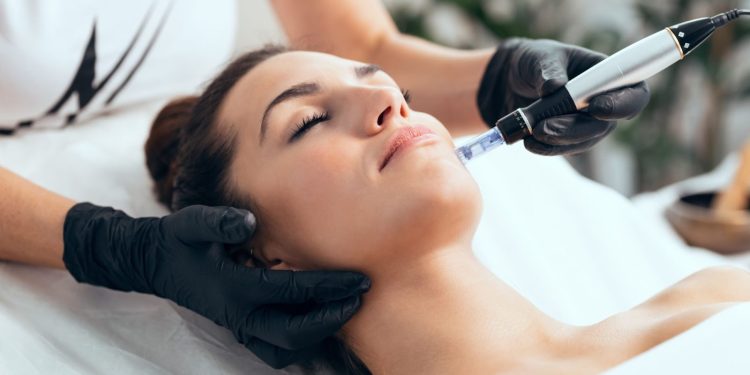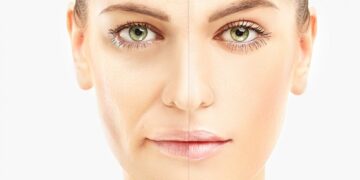Acne scars can leave us feeling self-conscious about our skin. Microneedling is a treatment that may offer hope to those struggling with these scars.
This blog post will explore how microneedling can help reduce acne scarring, offering insights into its effectiveness and what you can expect from the procedure.
Keep reading to learn more about this promising option for smoother, clearer skin.
Table of Contents
Key Takeaways
- Microneedling uses fine needles to create tiny punctures in the skin, triggering a healing process that produces collagen and improves acne scars.
- Studies show microneedling can reduce acne scarring by 50% to 70%, making the skin look smoother and more refined.
- The cost of microneedling treatments varies, with professional services typically costing more than at-home options but offering better results.
- Though effective for many, microneedling carries risks like potential new scarring, redness, and swelling; choosing a trained professional is crucial.
- People considering microneedling should discuss their medical history with a dermatologist to understand possible side effects and ensure safe treatment.
What is Microneedling?
Microneedling is a minimally invasive treatment that involves using fine needles to create hundreds of tiny, invisible puncture wounds in the top layer of skin.
Through the creation of tiny, controlled punctures in the skin’s surface, this procedure encourages the body to heal these micro-wounds by generating new collagen and elastin fibers.
By promoting new collagen growth, microneedling works effectively as a scar fading treatment, making it an ideal option for those looking to minimize acne scars and improve overall skin texture.
The process stimulates the body’s natural wound-healing process, resulting in increased collagen production, and skin repair and significantly improves the appearance of acne scars.
Studies suggest that this technique can fade acne scars by 50% to 70%, offering hope for smoother, more refined skin through natural repair mechanisms triggered by the treatment itself.

Source: Lara Clinic
Effectiveness of Microneedling for Acne Scars
Microneedling has shown promising results in reducing the appearance of acne scars, with studies suggesting improved skin texture and tone.
Research has shown that microneedling is an effective and safe treatment for atrophic acne scars.
The procedure has been found to reduce acne scars by up to 50%, with many individuals experiencing significant improvement after just one session.
Microneedling promotes the growth of new collagen in the skin, encourages natural healing, and contributes to long-lasting smoother skin texture. It also aids in the healing process and reduces scarring.
Additionally, studies have suggested that microneedling therapy induces normal wound healing, resulting in smoother skin texture and tone improvement over time.

Source: Brydie
Risks and Side Effects of Microneedling for Acne Scars
Microneedling for acne scars can create new scars, especially if it is not performed by a trained professional.
Some possible adverse effects include redness, swelling, and mild discomfort during and after the procedure.
Potential for creating new scars
Microneedling carries a risk of creating new scars, especially if done incorrectly or by an inexperienced practitioner. Improper technique can lead to complications such as hyperpigmentation and raised scars.
To minimize the risk of developing new scars, it’s essential to ensure that the procedure is performed by a qualified dermatologist.
Considering potential scarring, it’s crucial to thoroughly research and select a reputable professional with expertise in microneedling for acne scars.
This will help mitigate any risks associated with the treatment while maximizing the chances of achieving effective scar reduction results.
To address acne scars effectively through microneedling, consider seeking professional assistance from a trusted aesthetic clinic, Lara Clinic (if you are in Kuala Lumpur, Malaysia).
They have successfully treated numerous patients, providing expertise in microneedling to help improve acne scars.

Possible adverse effects
Besides creating new scars, skin irritation, redness, and swelling can occur in the initial days after a session. The patient may also experience bruising and pinpoint bleeding.
In rare cases, infection or allergic reactions may occur due to poor post-treatment care or unsterile equipment.
Additionally, individuals with a history of keloid scarring should exercise caution as microneedling could potentially trigger similar responses in the skin.
It’s crucial for individuals considering microneedling for acne scars to thoroughly discuss their medical history with a dermatologist before proceeding with the treatment.
Understanding the potential adverse effects can help manage expectations and ensure safe and effective results.
Cost of Microneedling for Acne Scars
The cost of microneedling for acne scars varies based on factors such as the size of the treatment area and the number of sessions needed.
Several factors influence the cost of microneedling for acne scars, including the severity of scarring and the number of sessions required. Additionally, the location and expertise of the service provider play a significant role in determining the overall cost.
The cost may also vary based on geographical location, with metropolitan areas typically commanding higher prices compared to smaller towns.
Moreover, specific post-treatment care products or follow-up appointments could contribute to an increase in total expenses.
Medical insurance usually does not cover elective cosmetic procedures such as microneedling for acne scars, so individuals should consider these out-of-pocket costs when planning for treatment.
Comparing professional vs at-home options
Professional microneedling treatments are performed by trained dermatologists or skincare professionals. These professionals use medical-grade devices with longer needles, which penetrate deeper into the skin to target severe acne scars.
Professional microneedling treatments tend to be more expensive than at-home options due to the specialized equipment and trained professionals involved.
In contrast, at-home microneedling options utilize shorter needles and are less powerful than professional treatments.
While professional sessions may be more costly, they provide a higher level of precision and effectiveness compared to at-home options.
When seeking professional microneedling for acne scars, it’s essential to consult with a qualified practitioner who can tailor the treatment to your specific needs.
Conclusion
In conclusion, microneedling has shown promising results in treating acne scars, offering a minimally invasive and effective solution for improving skin texture and appearance.
Consider consulting with a qualified dermatologist or skincare professional to explore the potential benefits of microneedling for addressing acne scars.
FAQs
1. What is microneedling and how does it help with acne scars?
Microneedling is a skin care treatment that uses tiny needles to create small wounds in the skin, which can improve skin texture, reduce acne scars, and promote skin rejuvenation.
2. Can microneedling treat different types of acne scars?
Yes, microneedling can effectively treat various types of acne scars including atrophic scars and post-acne blemishes by stimulating the skin’s healing process for scar reduction.
3. Will my skin tone and texture improve after microneedling?
Absolutely! Microneedling not only helps in treating facial scars but also improves your overall skin tone and texture making it smoother.
4. How often should I get microneedling for my acne scarring?
Dermatologists often recommend a series of treatments for best results in addressing acne scarring through microneedling; the exact number depends on your individual case.
5. Is there any special skincare routine I need to follow after getting microneedling for my acne scars?
After receiving a microneedling treatment, following a gentle skincare routine as advised by your dermatologist is crucial for promoting healing and maximizing benefits like scar reduction and improved complexion.


 Home
Home









